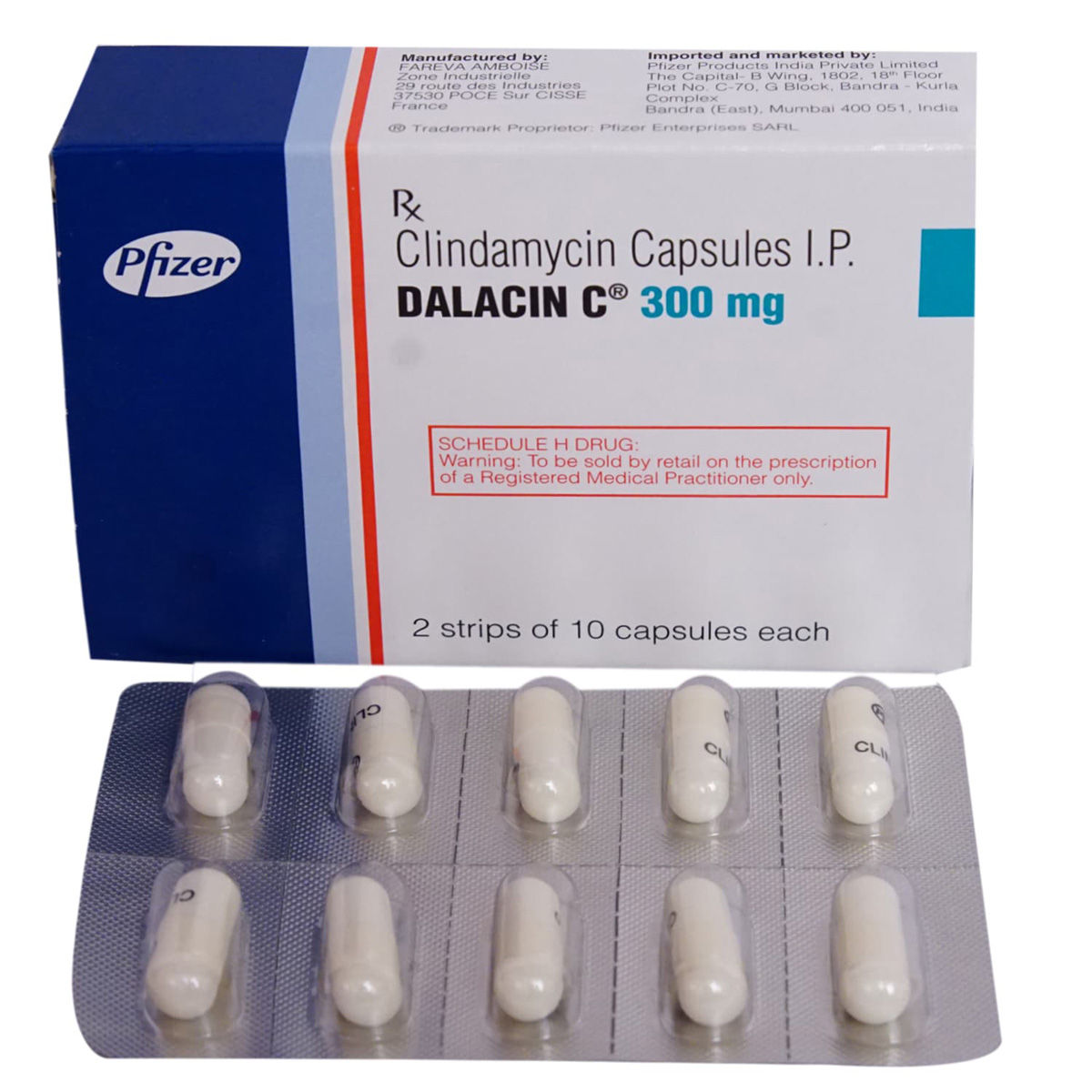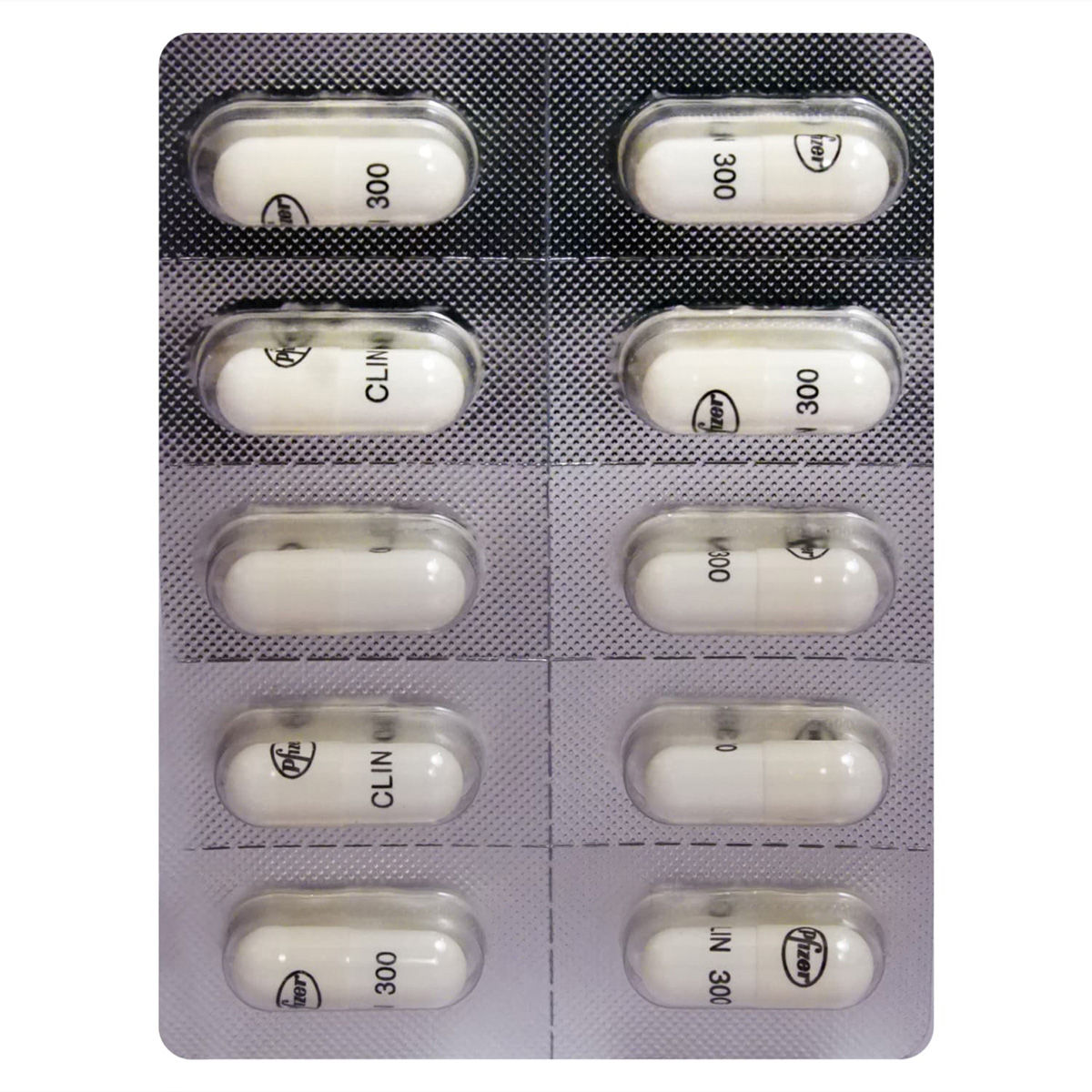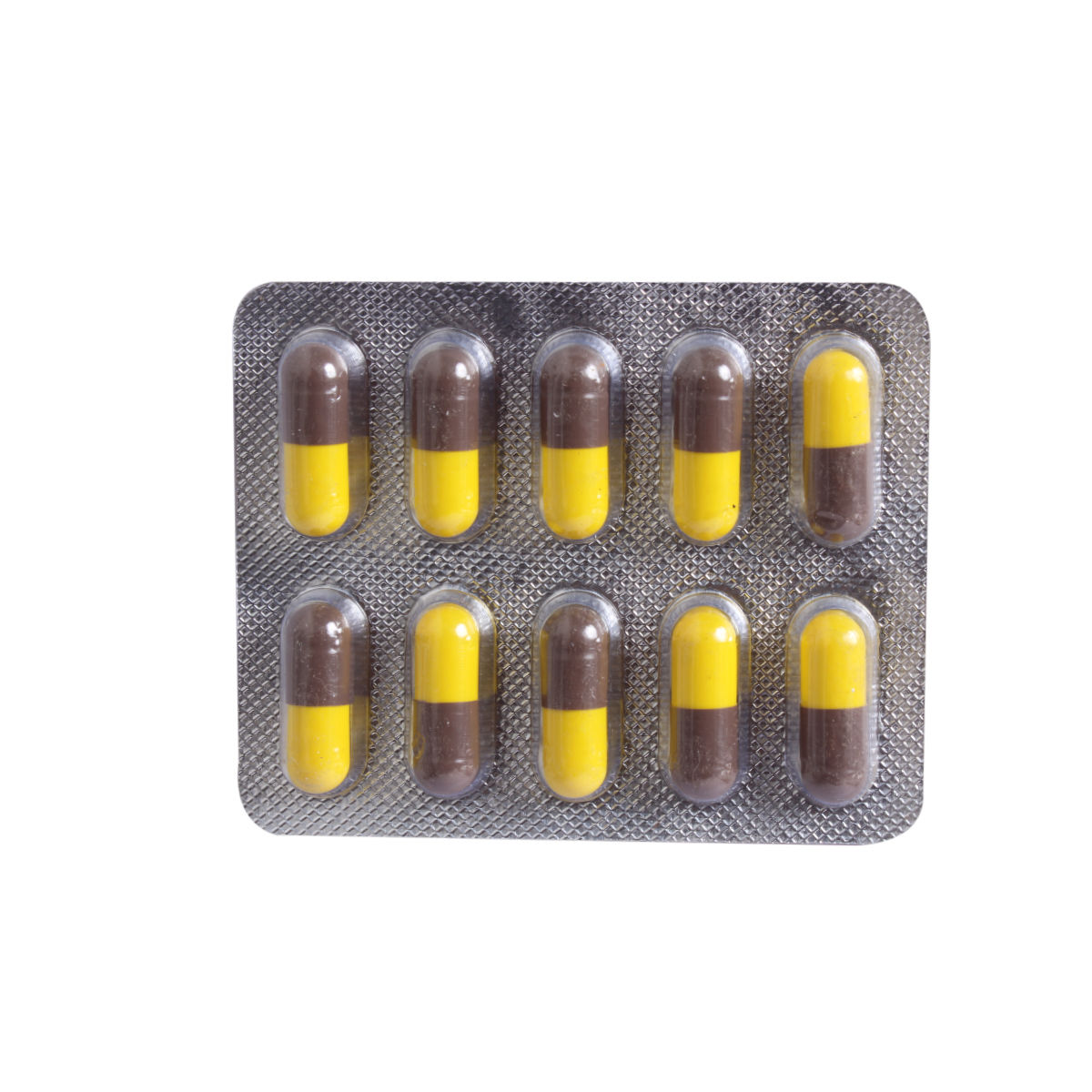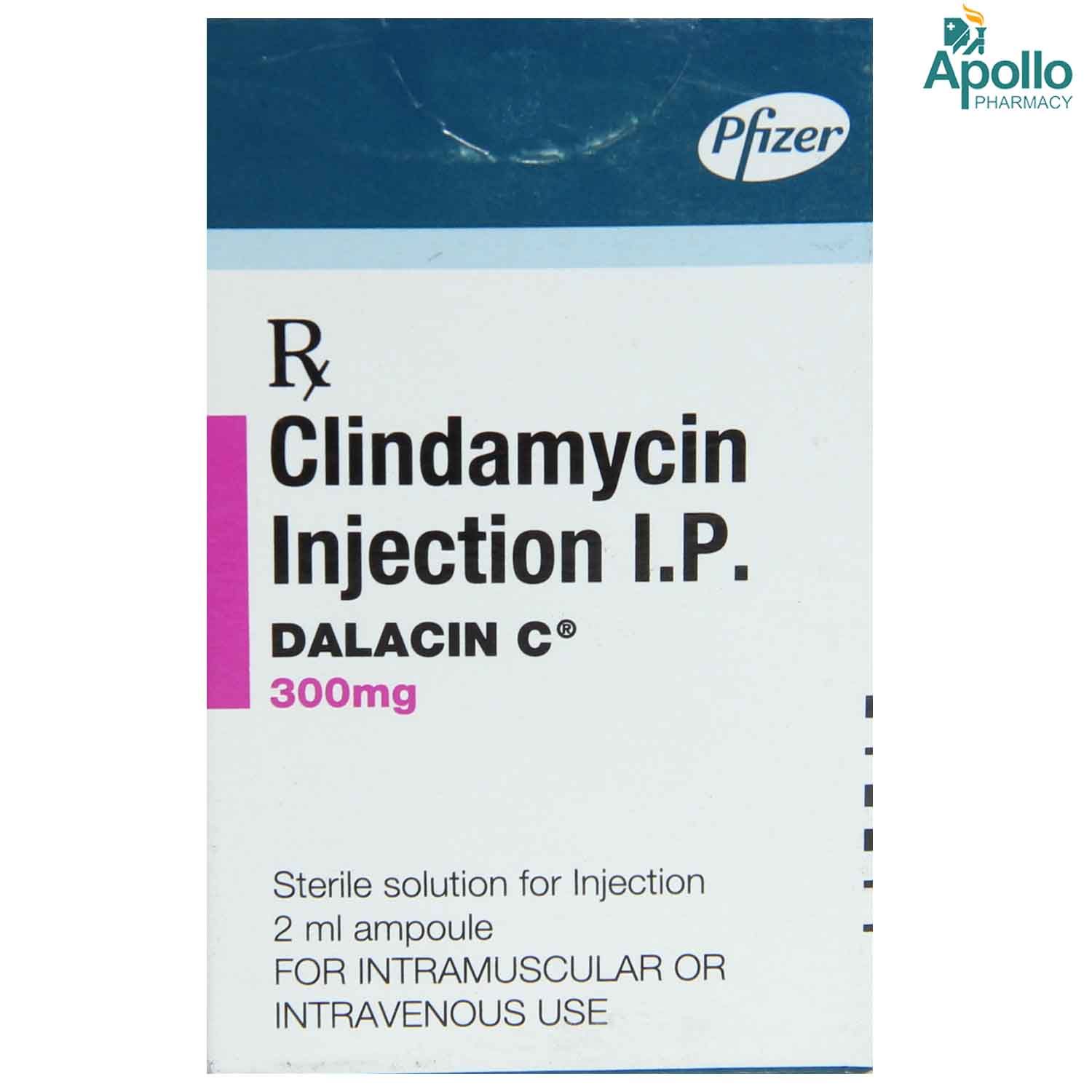Dalacin C 300 mg Capsule 10's




₹261.8*
MRP ₹297.5
12% off
₹261.8*
MRP ₹297.5
12% CB
₹35.7 cashback(12%)
Free Delivery
With Circle membership
(Inclusive of all Taxes)
This offer price is valid on orders above ₹800. Apply coupon PHARMA10/PHARMA18 (excluding restricted items)
Dalacin C 300 mg Capsule is an antibiotic medicine used in the treatment of bacterial infections. This medicine contains clindamycin, which works by inhibiting the protein synthesis of the bacterial cell and thereby helps fight infection-causing bacteria. This medicine is not effective for treating viral infections. Common side effects include stomach pain, nausea, vomiting, diarrhoea, heartburn, and skin rash.
Know Your Delivery Time
Provide Delivery Location
Available Offers
 Prescription drug
Prescription drugWhats That

Secure Payment

India's Most Trusted Pharmacy

Genuine Products
Composition :
Manufacturer/Marketer :
Consume Type :
Return Policy :
Expires on or after :
About Dalacin C 300 mg Capsule
Dalacin C 300 mg Capsule is used to treat bacterial infections. Bacterial infections occur when harmful bacteria grow in the body and cause illness. They can infect any part of the body and multiply very quickly. Dalacin C 300 mg Capsule will not work for viral infections like the common cold and flu.
Dalacin C 300 mg Capsule contains 'Clindamycin', which works by preventing bacterial protein synthesis, inhibiting bacterial growth. It also has a bacteriostatic effect that stops bacterial reproduction. Dalacin C 300 mg Capsule effectively treats infections caused by gram-positive and anaerobic (living without air) bacteria, including susceptible strains of Staphylococcus aureus, Streptococcus pneumoniae, and Clostridium perfringens.
Take Dalacin C 300 mg Capsule as advised by a doctor. Dalacin C 300 mg Capsule may cause side effects, although not everybody gets them. Common side effects of Dalacin C 300 mg Capsule include stomach pain, nausea, vomiting, diarrhoea, heartburn, skin rash, and vaginal itching or discharge. Most of these side effects do not require medical attention and gradually resolve over time. If these side effects persist longer, please consult your doctor.
Inform the doctor if you are allergic to any of the components in Dalacin C 300 mg Capsule . Let your doctor know if you have any liver disease, kidney disease, gastrointestinal diseases (colitis, an inflammation of the colon), yellow food dye allergy, or allergic conditions (asthma, hay fever, eczema). Do not use Dalacin C 300 mg Capsule while getting vaccinated with live bacterial vaccines (typhoid vaccine) since Dalacin C 300 mg Capsule may affect vaccine activity. Dalacin C 300 mg Capsule should be used only with a doctor's advice during pregnancy and breastfeeding.
Uses of Dalacin C 300 mg Capsule
• Treating bacterial infections: Dalacin C 300 mg Capsule is used to treat various bacterial infections, including skin, respiratory tract, and female reproductive organ infections.
• Bone and Joint infections: Dalacin C 300 mg Capsule treats bone and joint infections, such as osteomyelitis and septic arthritis, caused by susceptible bacteria.
• Intra-abdominal infections: Dalacin C 300 mg Capsule treats intra-abdominal infections by targeting and eliminating susceptible bacteria that cause the infection in the abdominal cavity, such as peritonitis or abscesses, helping to control the infection and promote recovery.
• Gynecological infections: Dalacin C 300 mg Capsule treats gynecological infections, such as pelvic inflammatory disease (PID), bacterial vaginosis, and endometritis, by targeting susceptible bacteria that cause these infections.
• Skin infections: Dalacin C 300 mg Capsule treats skin and skin structure infections, such as acne vulgaris, by targeting susceptible bacteria.
• Dental infections: Dalacin C 300 mg Capsule is sometimes prescribed for dental infections, including periodontal infections and abscesses, due to its effectiveness against anaerobic bacteria.
• Prophylaxis for surgical procedures: Dalacin C 300 mg Capsule may be administered as a prophylactic antibiotic before certain surgical procedures to reduce the risk of postoperative infections.
Directions for Use
Swallow Dalacin C 300 mg Capsule as a whole with a glass of water. Do not chew, crush or break it.
Medicinal Benefits
Dalacin C 300 mg Capsule is an antibiotic that treats bacterial infections. It works by inhibiting bacterial protein synthesis, which inhibits bacterial growth. It shows a bacteriostatic effect, stopping bacterial reproduction but not killing them. Dalacin C 300 mg Capsule effectively treats infections caused by gram-positive and anaerobic (living without air) bacteria, including susceptible strains of Staphylococcus aureus, Streptococcus pneumoniae, and Clostridium perfringens.
How Dalacin C 300 mg Capsule Works
Storage
- Take cold water baths avoiding soap.
- Avoid scratching and scrubbing to prevent infections while itching.
- Use nets to prevent insects and mosquitoes.
- Stop using lotions and creams that cause irritation.
- Avoid alcohol and caffeine intake.
- Abnormal liver function requires immediate medical attention. Your doctor may recommend lifestyle modifications along with needed medication.
- Avoid intake of alcohol as it has a direct impact on liver functioning.
- Prevent medications like paracetamol, over-the-counter painkillers or those mentioned by your doctor, as they may have issues getting metabolised in your body.
- If you have overweight issues, losing weight can be a good thing to manage abnormal liver function.
- Cut down the number of fatty foods that are taken daily.
- Inform Your Doctor: Notify your doctor immediately about your diarrhoea symptoms. This allows them to adjust your medication or provide guidance on managing side effects.
- Stay Hydrated: Drink plenty of fluids to replace lost water and electrolytes. Choose water, clear broth, and electrolyte-rich drinks. Avoid carbonated or caffeinated beverages to effectively rehydrate your body.
- Follow a Bland Diet: Eat easy-to-digest foods to help firm up your stool and settle your stomach. Try incorporating bananas, rice, applesauce, toast, plain crackers, and boiled vegetables into your diet.
- Avoid Trigger Foods: Steer clear of foods that can worsen diarrhoea, such as spicy, fatty, or greasy foods, high-fibre foods, and dairy products (especially if you're lactose intolerant).
- Practice Good Hygiene: Maintain good hygiene to prevent the spread of infection. To stay healthy, wash your hands frequently, clean and disinfect surfaces regularly, and avoid exchanging personal belongings with others.
- Take Anti-Diarrheal Medications: If your doctor advises, anti-diarrheal medications such as loperamide might help manage diarrhoea symptoms. Always follow your doctor's directions.
- Keep track of your diarrhoea symptoms. If they don't get better or worse or are accompanied by severe stomach pain, blood, or dehydration signs (like extreme thirst or dark urine), seek medical help.
- Drink water or other clear fluids.
- To prevent worsening of pain, limit intake of tea, coffee, or alcohol.
- Include bland foods like rice, toast, crackers, and rice in your diet.
- Avoid lying down immediately after eating as it may cause indigestion or heartburn.
- Avoid acidic and spicy food as it may cause indigestion.
- If you experience low blood pressure symptoms like dizziness, lightheadedness, or fainting while taking medication, seek immediate medical attention.
- Make lifestyle modifications and adjust your medication regimen under medical guidance to manage low blood pressure.
- As your doctor advises, regularly check your blood pressure at home. Record your readings to detect any changes and share them with your doctor.
- Fluid intake plays a vital role in managing blood pressure by maintaining blood volume, regulating blood pressure, and supporting blood vessel function. Drinking enough fluids helps prevent dehydration, maintain electrolyte balance, and regulate fluid balance.
- Take regular breaks to sit or lie down if you need to stand for long periods.
- When lying down, elevate your head with extra pillows to help improve blood flow.
- Avoid heavy exercise or strenuous activities that can worsen low blood pressure.
- Wear compression socks as your doctor advises to enhance blood flow, reduce oedema, and control blood pressure.
- If symptoms persist or worsen, or if you have concerns about your condition, seek medical attention for personalized guidance and care.
What if I have taken an overdose of Dalacin C 300 mg Capsule
Drug Warnings
Do not use Dalacin C 300 mg Capsule if you are allergic to any of its components. Let your doctor know if you have any liver or kidney diseases, gastrointestinal diseases (colitis, Clostridium difficile-associated diarrhoea), yellow food dye allergy, and allergic conditions (asthma, hay fever, eczema). Do not use Dalacin C 300 mg Capsule while getting vaccinated with live bacterial vaccines (typhoid vaccine) since Dalacin C 300 mg Capsule may affect vaccine activity. Pregnant and breastfeeding women should consult their doctor before taking Dalacin C 300 mg Capsule . Dalacin C 300 mg Capsule should be used in children only when prescribed by a doctor.
Drug-Drug Interactions
Drug-Drug Interactions
Login/Sign Up
Co-administration of Dalacin C 300 mg Capsule with Bacitracin may increase the risk of kidney and/or nerve damage.
How to manage the interaction:
Although there is a possible interaction, Dalacin C 300 mg Capsule can be taken with bacitracin if prescribed by the doctor. Consult the prescriber if you experience signs and symptoms of kidney damage such as sudden weight gain or weight loss, nausea, vomiting, fluid retention, loss of appetite, increased or decreased urination, swelling, shortness of breath, muscle cramps, tiredness, weakness, dizziness, confusion, and irregular heart rhythm. Let your doctor know if you develop seizures; hearing problems; or numbness, burning or tingling in your hands and feet. If you develop diarrhoea or vomiting during treatment with these medications, drink plenty of fluids to prevent dehydration, as dehydration may harm the kidney.
Taking Dalacin C 300 mg Capsule with Botulinum toxin can increase the risk or severity of side effects.
How to manage the interaction:
Taking Dalacin C 300 mg Capsule with Botulinum toxin together can result in an interaction, they can be taken together if prescribed by a doctor. However, if you experience any unusual symptoms contact a doctor immediately. Do not discontinue any medications without consulting a doctor.
Co-administration of of Dalacin C 300 mg Capsule with gentamicin may increase the risk of kidney and/or nerve damage.
How to manage the interaction:
Although there is a possible interaction, Dalacin C 300 mg Capsule can be taken with gentamicin if prescribed by the doctor. Consult the prescriber if you experience signs and symptoms of kidney damage such as sudden weight gain or weight loss, nausea, vomiting, fluid retention, loss of appetite, increased or decreased urination, swelling, shortness of breath, muscle cramps, tiredness, weakness, dizziness, confusion, and irregular heart rhythm. If you develop diarrhea or vomiting during treatment with these medications, drink plenty of fluids to prevent dehydration, as dehydration may also harm the kidney.
Co-administration of Carbamazepine and Dalacin C 300 mg Capsule together may result in reduced blood levels of Dalacin C 300 mg Capsule, which could make it less effective in treating your disease.
How to manage the interaction:
Although taking carbamazepine and Dalacin C 300 mg Capsule together can possibly result in an interaction, it can be taken if a doctor has prescribed it. If you experience any symptoms like fever, it is advised to consult a doctor. Without consulting a doctor, never stop taking any medications.
Co-administration of Dalacin C 300 mg Capsule may reduce the activity of the cholera vaccine.
How to manage the interaction:
Talk to your doctor before receiving the Cholera vaccine if you are currently being treated with Dalacin C 300 mg Capsule or have been treated within the last 14 days. To ensure adequate vaccine response, you should not receive cholera vaccine until at least 14 days after you complete antibiotic therapy. Do not discontinue the medication without consulting a doctor.
When Ethinylestradiol and Dalacin C 300 mg Capsule are taken together, the effects of Dalacin C 300 mg Capsule can be reduced.
How to manage the interaction:
There may be a possibility of interaction between Ethinylestradiol and Dalacin C 300 mg Capsule, but it can be taken if prescribed by a doctor. Do not stop using any medications without a doctor's advice.
Concomitant use of Dalacin C 300 mg Capsule with indinavir may increase the effects of Dalacin C 300 mg Capsule.
How to manage the interaction:
Although there is a possible interaction, Dalacin C 300 mg Capsule can be taken with indinavir if prescribed by the doctor. Consult the prescriber if you experience persistent vomiting, nausea, abdominal pain, or diarrhoea.
When Dalacin C 300 mg Capsule is taken with Fosphenytoin, it can cause the body to process Dalacin C 300 mg Capsule faster.
How to manage the interaction:
Although there is a possible interaction between Dalacin C 300 mg Capsule and Fosphenytoin, you can take these medicines together if prescribed by your doctor. If you notice any symptoms like sudden drowsiness, fatigue, confusion, itching, burning, or tingling sensation, abnormal body movements, or loss of coordination, make sure to contact your doctor right away. Do not stop using any medications without first talking to your doctor.
Concomitant use of Dalacin C 300 mg Capsule with ceritinib can increase the effects of Dalacin C 300 mg Capsule
How to manage the interaction:
Although there is a possible interaction, Dalacin C 300 mg Capsule can be taken with ceritinib if prescribed by the doctor. Consult the prescriber if you experience persistent vomiting, nausea, abdominal pain, or diarrhoea.
Concomitant use of Dalacin C 300 mg Capsule with itraconazole can reduce the metabolism and increase the levels of Dalacin C 300 mg Capsule in the body. This may increase the risk or severity of side effects.
How to manage the interaction:
Although there is a possible interaction, Dalacin C 300 mg Capsule can be taken with itraconazole if prescribed by the doctor. Consult a doctor immediately if you experience persistent vomiting, nausea, abdominal pain, or diarrhea. Do not stop using any medications without first talking to your doctor.
Drug-Food Interactions
Drug-Food Interactions
Login/Sign Up
Diet & Lifestyle Advise
- Include whole-grain foods like multigrain bread and brown rice in your diet.
- Taking probiotics after an antibiotic treatment reduces the risk of antibiotic-associated diarrhoea.
- Try taking yoghurt, cheese, sauerkraut, and kimchi that help restore the intestine's good bacteria.
- Include more fibre-enriched food in your diet that is easily digested by your gut bacteria. Fibre foods may also help restore healthy gut bacteria after a course of antibiotics.
- Avoid intake of alcoholic beverages as it can make you dehydrated and affect your sleep.
- Manage stress, eat healthily, drink plenty of water, exercise regularly, and get plenty of sleep.
Habit Forming
Therapeutic Class
Dalacin C 300 mg Capsule Substitute

Clindatec 300 mg Capsule 8's
by Others
₹25.26per tabletClindasure 300mg Capsule 10's
by AYUR
₹26.78per tabletClincin 300 mg Capsule 10's
by Others
₹26.78per tabletCamyda 300 Capsule 10's
by AYUR
₹26.78per tabletDalacin C 300 mg Injection 2 ml
by Others
₹55.90per tablet
Product Substitutes
Alcohol
Caution
Avoid taking alcohol while using Dalacin C 300 mg Capsule since it may worsen the side effects.
Pregnancy
Caution
Please consult your doctor before taking Dalacin C 300 mg Capsule if you are pregnant or planning to conceive.
Breast Feeding
Caution
Dalacin C 300 mg Capsule is not recommended during breastfeeding since it can be excreted into breast milk. Please consult your doctor before taking Dalacin C 300 mg Capsule if you are breastfeeding.
Driving
Safe if prescribed
Dalacin C 300 mg Capsule usually does not interfere with your driving ability.
Liver
Caution
Let your doctor know if you have any history of liver diseases before taking Dalacin C 300 mg Capsule since it may cause jaundice and abnormal liver function tests.
Kidney
Caution
Let your doctor know if you have any history of kidney diseases before taking Dalacin C 300 mg Capsule .
Children
Caution
Dalacin C 300 mg Capsule should be used in children only when prescribed by a doctor. Your doctor will prescribe the dose depending on the child's age and body weight.
FAQs
Dalacin C 300 mg Capsule is used to treat bacterial infections.
Dalacin C 300 mg Capsule is an antibiotic that treats bacterial infections. It works by inhibiting bacterial protein synthesis, which retards bacterial growth.
Dalacin C 300 mg Capsule should be used with proper caution and doctor consultation if you have any liver or kidney disease, gastrointestinal diseases (colitis, an inflammation of the colon), yellow food dye allergy, or allergic conditions (asthma, hay fever, eczema).
Dalacin C 300 mg Capsule can affect live vaccines, like the typhoid vaccine, and decrease their effectiveness. Please consult a doctor before you start Dalacin C 300 mg Capsule if you are due to undergo any vaccinations.
Dalacin C 300 mg Capsule may cause abnormal liver function tests as one of its side effects. Please consult your doctor before starting Dalacin C 300 mg Capsule if you have any history of liver problems.
It is recommended to complete the course of Dalacin C 300 mg Capsule even if you feel better as it is an antibiotic, and stopping it midway may lead to recurring infections.
Diarrhoea can be a side-effect of Dalacin C 300 mg Capsule . Drink enough fluids and eat non-spicy food if you experience diarrhoea. If you find blood in stools (tarry stools) or experience severe diarrhoea, consult your doctor. Do not take anti-diarrhoeal medicine on your own.
Country of origin
Manufacturer/Marketer address
Customers Also Bought
Disclaimer
Author Details
We provide you with authentic, trustworthy and relevant information


























